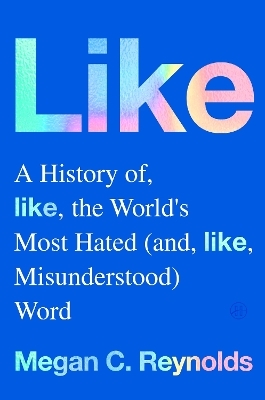
Like
A History of the World's Most Hated (and Misunderstood) Word
Seiten
2025
HarperOne (Verlag)
978-0-06-341528-7 (ISBN)
HarperOne (Verlag)
978-0-06-341528-7 (ISBN)
- Noch nicht erschienen (ca. Juli 2025)
- Versandkostenfrei innerhalb Deutschlands
- Auch auf Rechnung
- Verfügbarkeit in der Filiale vor Ort prüfen
- Artikel merken
A comprehensive and thought-provoking investigation into one of the most polarizing words in the English language.
Few words in the English language are as misunderstood as “like.” Indeed, excessive use of this word is a surefire way to make those who pride themselves on propriety, both grammatical and otherwise, feel compelled to issue correctives.
But what the detractors of this word fail to understand is its true function and versatility—as an exclamation, a filler of space, a means of subtle emphasis, and more. “Like” may have started out as slang, but it is now an intrinsic component of fun, serious, and altogether nurturing communication. And like any colloquialism, the word endears the speaker to its audience; a conversation full of likes feels more casual, despite its content.
In this book, culture writer and editor for Dwell magazine Megan C. Reynolds takes us through the unique etymology and usage of this oft-reviled word, highlighting how it is often used to undermine people who are traditionally seen as having less status in society—women, younger people, people from specific subcultures—and how, if thought about differently, it might open up a new way of communication and validation. Written in a breezy yet informative and engaging style, this is a must-read for anyone who considers themselves a grammarian, a lover of language, and an advocate for the marginalized in discussions of cultural capital, power, and progress.
Few words in the English language are as misunderstood as “like.” Indeed, excessive use of this word is a surefire way to make those who pride themselves on propriety, both grammatical and otherwise, feel compelled to issue correctives.
But what the detractors of this word fail to understand is its true function and versatility—as an exclamation, a filler of space, a means of subtle emphasis, and more. “Like” may have started out as slang, but it is now an intrinsic component of fun, serious, and altogether nurturing communication. And like any colloquialism, the word endears the speaker to its audience; a conversation full of likes feels more casual, despite its content.
In this book, culture writer and editor for Dwell magazine Megan C. Reynolds takes us through the unique etymology and usage of this oft-reviled word, highlighting how it is often used to undermine people who are traditionally seen as having less status in society—women, younger people, people from specific subcultures—and how, if thought about differently, it might open up a new way of communication and validation. Written in a breezy yet informative and engaging style, this is a must-read for anyone who considers themselves a grammarian, a lover of language, and an advocate for the marginalized in discussions of cultural capital, power, and progress.
Megan C. Reynolds is an editor at Dwell magazine, and previously worked at the now defunct Jezebel and The Billfold. She’s written for Buzzfeed, the New York Times, Elle, Gawker, Bustle, Vulture, and other outlets. Megan was also the co-host of the short-lived, celebrity-gossip focused podcast Dirtcast. She lives in New York City.
| Erscheint lt. Verlag | 31.7.2025 |
|---|---|
| Verlagsort | New York |
| Sprache | englisch |
| Maße | 140 x 210 mm |
| Gewicht | 454 g |
| Themenwelt | Geisteswissenschaften ► Sprach- / Literaturwissenschaft ► Anglistik / Amerikanistik |
| Geisteswissenschaften ► Sprach- / Literaturwissenschaft ► Literaturwissenschaft | |
| Geisteswissenschaften ► Sprach- / Literaturwissenschaft ► Sprachwissenschaft | |
| ISBN-10 | 0-06-341528-3 / 0063415283 |
| ISBN-13 | 978-0-06-341528-7 / 9780063415287 |
| Zustand | Neuware |
| Informationen gemäß Produktsicherheitsverordnung (GPSR) | |
| Haben Sie eine Frage zum Produkt? |
Mehr entdecken
aus dem Bereich
aus dem Bereich
Poetik eines sozialen Urteils
Buch | Hardcover (2023)
De Gruyter (Verlag)
59,95 €
Buch | Softcover (2024)
belleville (Verlag)
20,00 €


